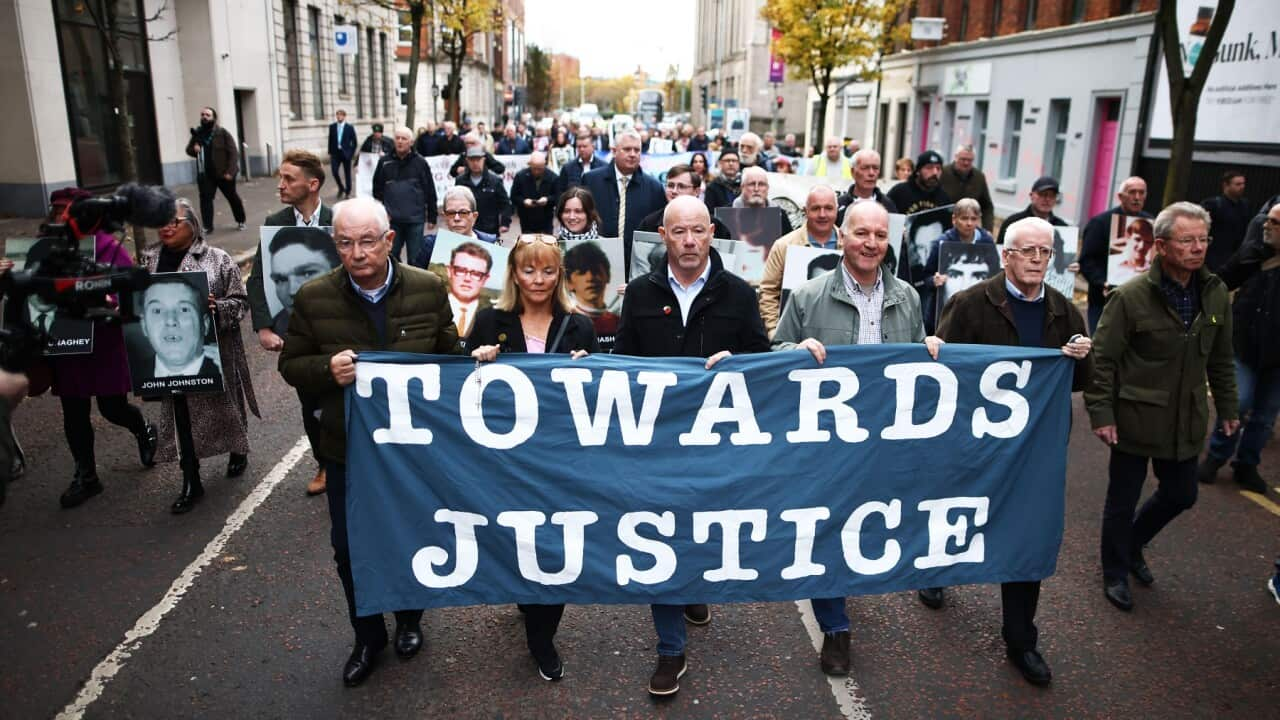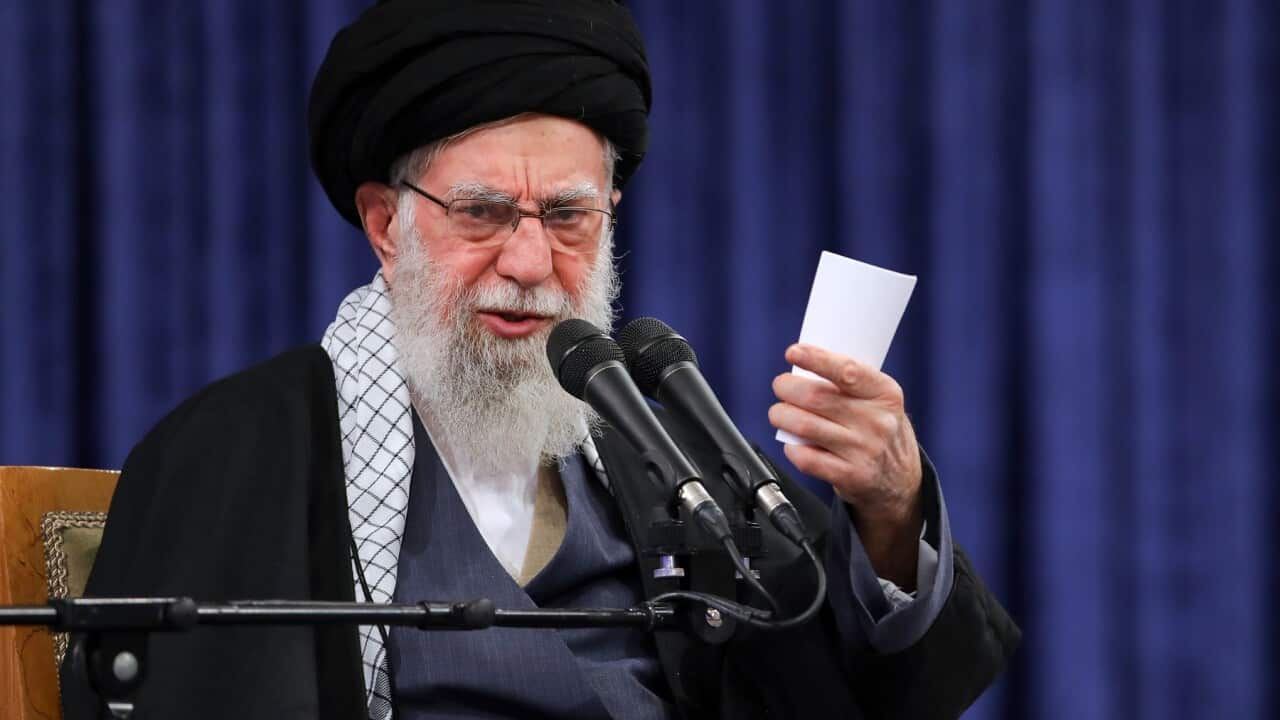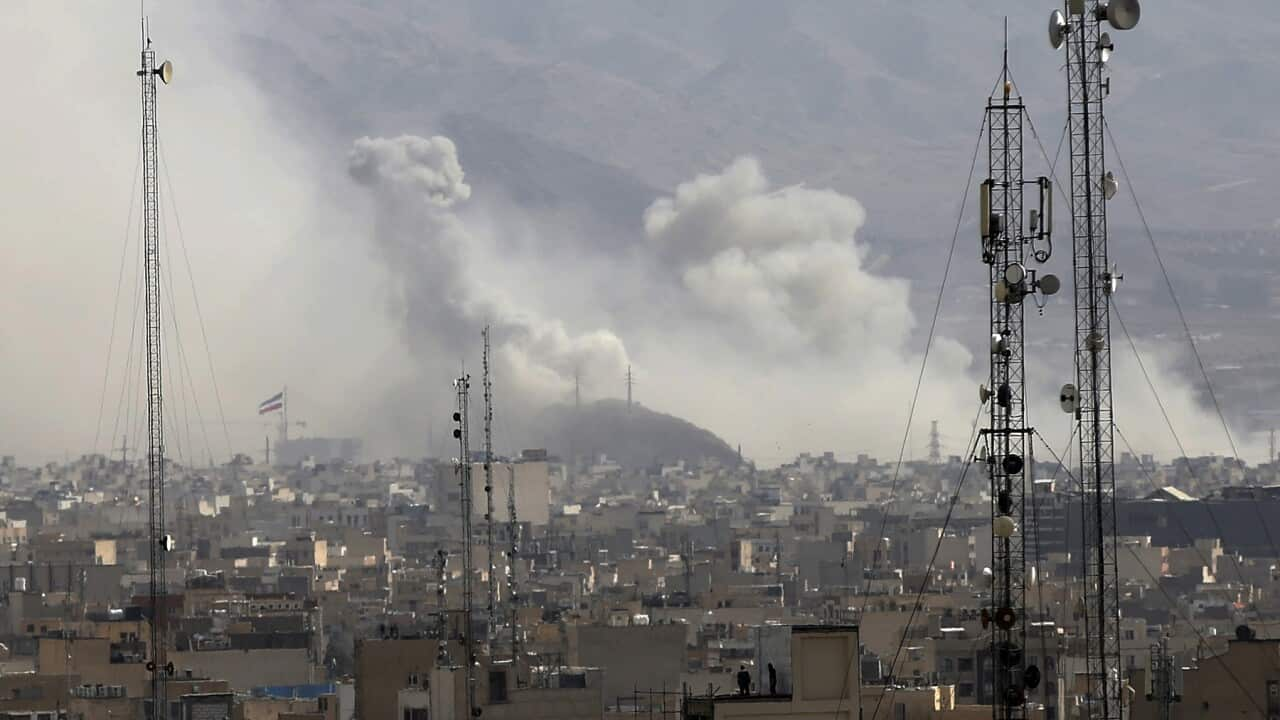Listen to Australian and world news, and follow trending topics with SBS News Podcasts.
TRANSCRIPT:
On January 30 in 1972, thousands of people gathered in the Northern Ireland city of Derry for a march to protest the then UK government's policy of internment, a policy that allowed them to imprison suspected I-R-A members without a trial.
The demonstration ultimately ended in tragedy, when soldiers from the First Battalion parachute regiment opened fire on the crowd, killing thirteen men in total.
Some of the violence was captured by Gerald Seymour, a reporter on the scene for the broadcaster I-T-N.
REPORTER: "The organisers of this civil rights march promised that they would be non-violent. The army said throughout the day that they hoped to use minimum force. But three hours after the procession began, this has ended up - as dusk comes onto the bogside - as the worst ever confrontation between the Army and the Catholic people of the Cragen and Bogside." ((sounds of gunshots))
The shootings became known as Bloody Sunday - and the deadliest single episode in the three decades of Northern Ireland violence known as 'The Troubles'.
But no-one - apart from one soldier, identified only as Soldier F - has ever been prosecuted for what happened.
Now, after a four week trial in Belfast Crown Court on two murder charges and five of attempted murder, Judge Patrick Lynch has delivered the words families of the victims had long been dreading: NOT guilty.
The judge ruled that he was satisfied the former paratrooper was among a group of soldiers who shot at civilians after the civil rights march, saying that those involved should "hang their heads in shame".
But the judge ultimately decided the evidence did not reach the threshold required to convict Soldier F.
Mickey McKinney, whose brother William was among the 13 civilians killed that day, reacted outside court.
"The Bloody Sunday families do not lay the blame for today's decision on the trial judge. The blame lies firmly with the British state, with the RUC who failed to investigate the murders on Bloody Sunday properly - or indeed at all - and with the British Army, who shielded and enabled its soldiers to continue to murder with impunity."
The member for Foyle, Colum Eastwood, also weighed in.
"Everybody now knows what happened on Bloody Sunday. Everybody knows the victims were innocent. And everybody knows where the guilt actually lies."
Along with the Bloody Sunday families, there were also supporters outside court for groups representing veterans.
Northern Ireland Veterans Movement spokesman Paul Young had some particularly strong words for those assembled:
"Veterans across the whole of the United Kingdom that served in Northern Ireland with honour and courage will be heartened by this verdict today. You can hear the barracking that I'm getting from people behind me. That shows the good grace they do not have."
So what happens now?
The Bloody Sunday case remains deeply divisive in Northern Ireland, where the decades of sectarian violence that began in the 1960s still cast a long shadow.
And while Soldier F has been found not guilty, lingering questions remain about accountability for violence and deaths during the Troubles - including Bloody Sunday - and the years spent in the pursuit of justice.
The government had initially said soldiers from the parachute regiment opened fire at gunmen and bombers who were attacking them, and a formal inquiry cleared the troops of responsibility.
A subsequent and 12-year long review in 2010 by Lord Saville reached a very different conclusion, with then-prime minister David Cameron telling parliament that the investigation had found soldiers fired at unarmed people fleeing - and then lied about it for decades.
"The conclusions of this report are absolutely clear: there is no doubt, there is nothing equivocal, there are no ambiguities. What happened on Bloody Sunday was both unjustified and unjustifiable."
The findings of the Saville report are what ultimately paved the way for the Soldier F trial.
The report sparked a police probe, which in turn resulted in eighteen former soldiers being reported to the Public Prosecution Service.
Soldier F was the only one ever charged.
Director of Public Prosecutions Stephen Herron has defended the decision to bring Soldier F to trial, despite concerns about the strength of the evidence, which DUP leader Gavin Robinson has told UTV stems from a lack of investigation in the first place of many of incidents during the Troubles.
"We know that there is the potential for further cases like this in the future. But I think this case - Soldier F's case and the cases that have arisen from Bloody Sunday - show very clearly that the passage of time and the frailty of evidence means there are unlikely to be successful prosecutions."
The UK government has released a statement saying it is committed to finding a way forward that acknowledges the past.
In fact, the UK House of Commons has begun debating a bill introduced by Northern Ireland secretary Hilary Ben that he hopes will bring answers to those impacted by that period.
He has told Parliament it will undo a law introduced by the last Conservative government that banned inquests and other civil actions arising from incidents during the Troubles.
The Secretary says doing so will give people more complete answers about what happened to their loved ones - which he argues is all most people want.
"This is a significant moment, this partnership with the Irish government. Because in moving from non-cooperation to cooperation it will open up the possibility of more information coming to families. The last Legacy Act created circumstances in which the law that was passed was not compatible with our international obligations. The law that I am bringing to the house will fix that; will deal with it."
Northern Ireland Veterans Commissioner David Johnstone says he doesn't want the ensuing process to unfairly demonise veterans.
"Society in Northern Ireland must find a way to deal with legacy issues in a fair and in a balanced way, one which will not disproportionately focus on the actions of the military or police, and distort the historical record of the conflict. It must be rememembered that nine out of ten deaths during the Troubles were caused by terrorist organisations."
Mickey McKinney has told Channel 4 the Bloody Sunday families have no intention of giving up the fight for justice.
"It was only one soldier we got in the court. But we got him in the court. And we're not done yet."
Meanwhile, back in Derry, the case has brought fresh grief for the families, including for Liam Wray, whose brother James was killed on Bloody Sunday.
He spoke to the BBC.
"It's emotional. Certainly it's emotional because it takes you back to that day. It takes you back to the horror of that day. It takes you back to 'what a waste, when will people learn'."













